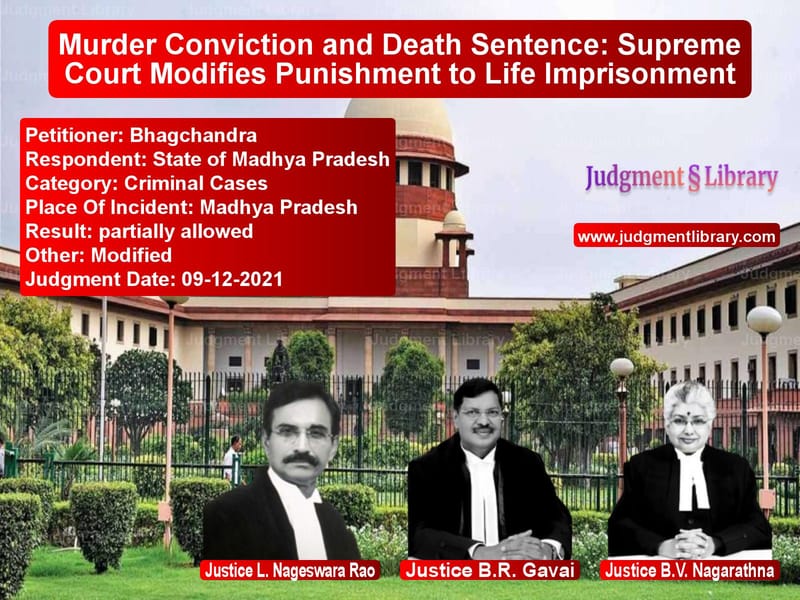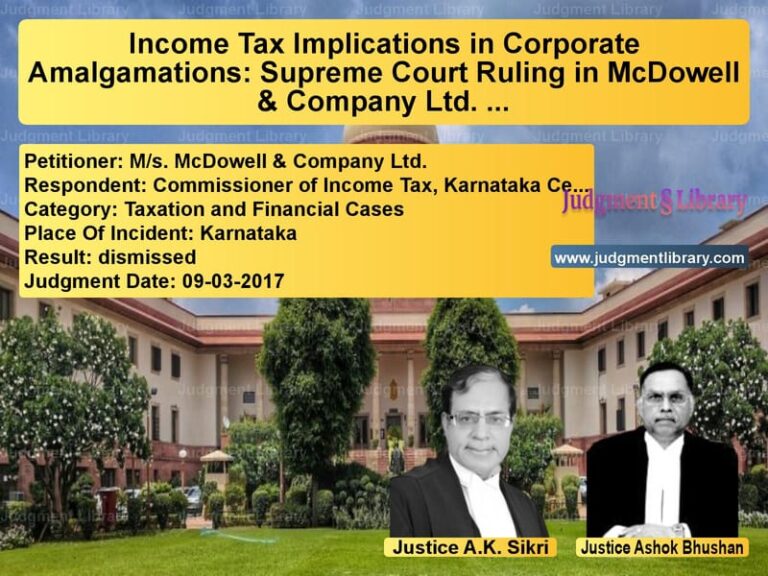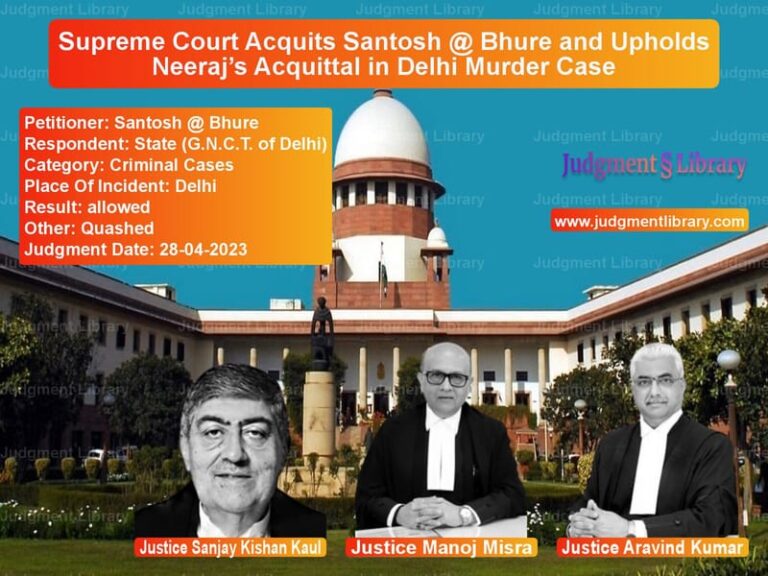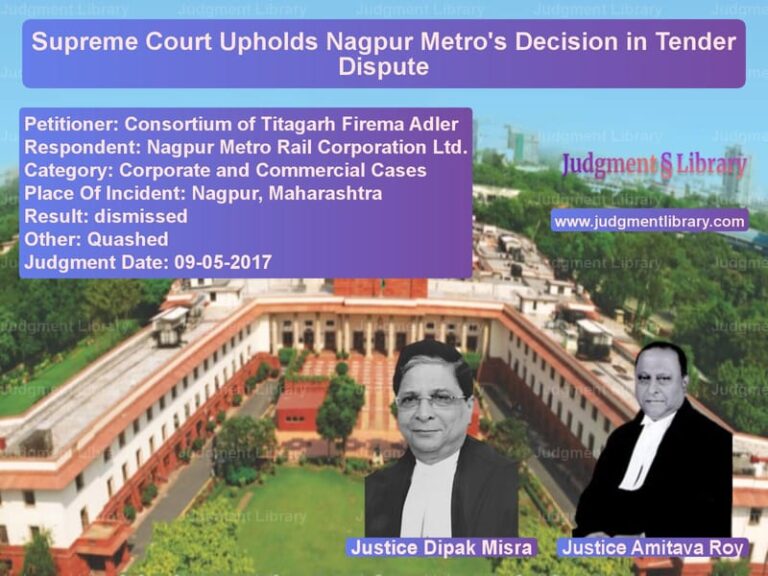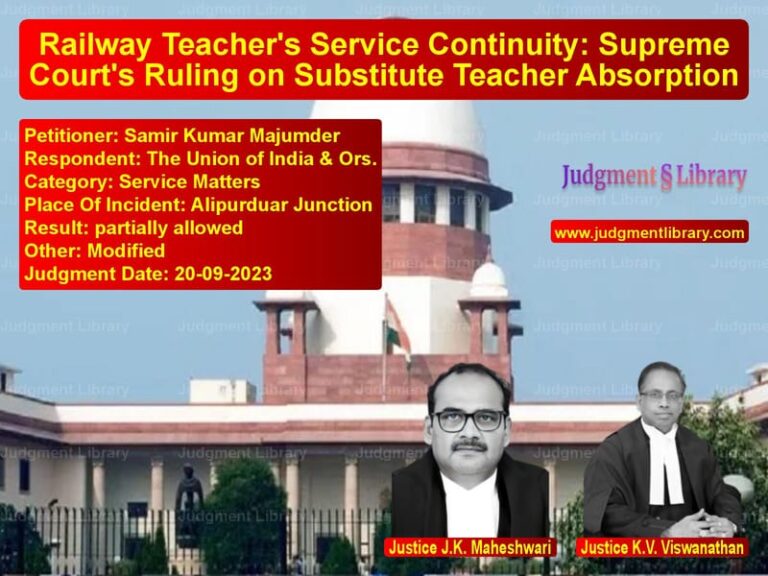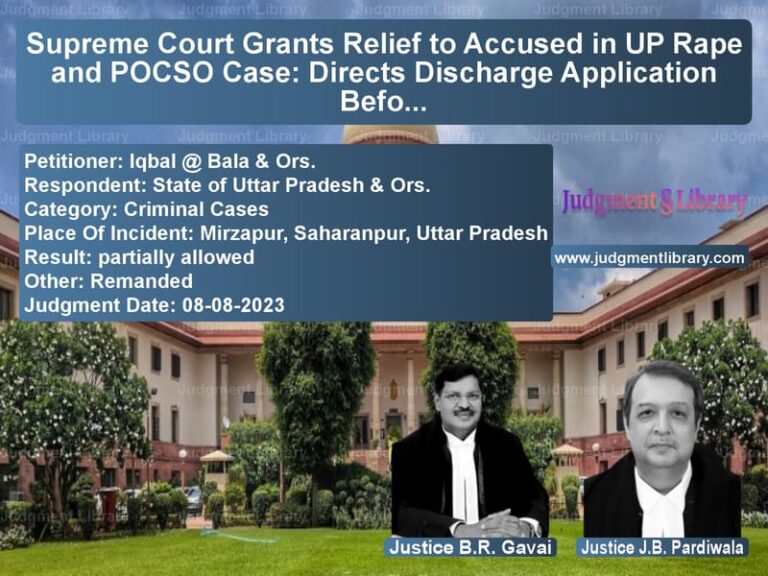Murder Conviction and Death Sentence: Supreme Court Modifies Punishment to Life Imprisonment
The Supreme Court of India recently delivered a crucial judgment in the case of Bhagchandra vs. State of Madhya Pradesh, where the appellant had been sentenced to death for committing multiple murders. The Court, after a detailed evaluation of the evidence and mitigating factors, reduced the sentence to life imprisonment with a rigorous term of 30 years. The case highlights the judiciary’s role in balancing justice with human rights considerations in capital punishment cases.
Background of the Case
The appellant, Bhagchandra, was convicted for the brutal murder of three family members: his two brothers and his nephew. The incident occurred on October 11, 2015, in the early hours of the morning in the village of Pur, Madhya Pradesh. The prosecution alleged that the murders were driven by property disputes between the accused and the deceased family members.
The prosecution relied on the testimony of Kiran Patel (PW-1), the wife of one of the deceased, who witnessed the crime. According to her statement, she saw the appellant exiting the house with an axe. Upon entering, she found her brother-in-law Thakur Das and son Akhilesh dead with severe injuries. She later witnessed the accused attacking her husband, Devki Prasad, in a nearby field. The police were immediately informed, and a First Information Report (FIR) was registered.
Trial Court and High Court Decisions
The trial court found the appellant guilty and sentenced him to death under Section 302 of the Indian Penal Code (IPC), along with seven years of rigorous imprisonment under Sections 201 and 506-B. The case was referred to the High Court for confirmation of the death sentence under Section 366 of the Code of Criminal Procedure (Cr.P.C.). The High Court upheld the conviction and confirmed the death penalty.
Arguments Presented Before the Supreme Court
Appellant’s Arguments:
- The appellant’s counsel, Shri N. Hariharan, argued that the case was fabricated at the instance of Kiran Patel (PW-1) due to property disputes.
- There were inconsistencies in the prosecution’s evidence, including contradictions in witness testimonies and issues with the timing of the crime.
- The post-mortem reports indicated semi-digested food in the victims’ stomachs, suggesting that the time of death differed from the prosecution’s claims.
- The recovery of the weapon (axe) was not substantiated by serology reports linking it to the crime.
- Even if the conviction was upheld, the death penalty was excessive given the accused had no prior criminal record and could be reformed.
Respondent’s Arguments:
- The prosecution, represented by Smt. Swarupama Chaturvedi, contended that the eyewitness testimonies were credible and supported by medical evidence.
- Minor inconsistencies in statements were expected in traumatic cases and should not discredit the entire prosecution case.
- The brutality of the crime, where the appellant beheaded the victims, warranted the death penalty.
Supreme Court’s Observations
The Supreme Court closely examined the reliability of the prosecution’s evidence and concluded that:
- The testimony of key witnesses, including Kiran Patel and her children, was credible.
- The crime was indeed committed by the appellant, as confirmed by multiple eyewitnesses.
- Minor contradictions in statements did not shake the core of the prosecution’s case.
However, while upholding the conviction, the Court addressed the issue of sentencing.
Reduction of Death Sentence
The Supreme Court referred to landmark precedents such as Bachan Singh v. State of Punjab and Machhi Singh v. State of Punjab, which established the ‘rarest of rare’ doctrine for imposing the death penalty. The Court emphasized the necessity of considering not just the crime but also the criminal, their background, and the potential for reformation.
Read also: https://judgmentlibrary.com/supreme-court-dismisses-review-petition-in-criminal-case-no-error-found/
The Court found that:
- The trial court had imposed the death penalty on the same day as the conviction, denying the accused a meaningful opportunity to present mitigating factors.
- The appellant had no prior criminal record, indicating he was not a hardened criminal.
- The jail authorities confirmed that the appellant had maintained good conduct during incarceration.
- The prosecution failed to present any evidence proving that the appellant could not be reformed.
Final Verdict
The Supreme Court modified the sentence from the death penalty to life imprisonment with a rigorous term of 30 years. The Court ruled that the appellant should not be eligible for parole or remission during this period, ensuring justice for the victims while acknowledging the possibility of rehabilitation.
Key Takeaways
- Balancing justice and reformation: The Supreme Court reaffirmed that the death penalty should only be imposed in the ‘rarest of rare’ cases where rehabilitation is impossible.
- Proper sentencing procedure: The ruling underscores the importance of providing the accused with adequate opportunity to present mitigating circumstances before imposing capital punishment.
- Judicial discretion in sentencing: The judgment demonstrates the judiciary’s responsibility to ensure proportional punishment, weighing both the gravity of the crime and the background of the offender.
This judgment sets a critical precedent in criminal jurisprudence, reinforcing the need for a humane approach to sentencing, even in heinous crimes.
Petitioner Name: Bhagchandra.Respondent Name: State of Madhya Pradesh.Judgment By: Justice L. Nageswara Rao, Justice B.R. Gavai, Justice B.V. Nagarathna.Place Of Incident: Madhya Pradesh.Judgment Date: 09-12-2021.
Don’t miss out on the full details! Download the complete judgment in PDF format below and gain valuable insights instantly!
Download Judgment: bhagchandra-vs-state-of-madhya-prad-supreme-court-of-india-judgment-dated-09-12-2021.pdf
Directly Download Judgment: Directly download this Judgment
See all petitions in Murder Cases
See all petitions in Attempt to Murder Cases
See all petitions in Judgment by L. Nageswara Rao
See all petitions in Judgment by B R Gavai
See all petitions in Judgment by B.V. Nagarathna
See all petitions in partially allowed
See all petitions in Modified
See all petitions in supreme court of India judgments December 2021
See all petitions in 2021 judgments
See all posts in Criminal Cases Category
See all allowed petitions in Criminal Cases Category
See all Dismissed petitions in Criminal Cases Category
See all partially allowed petitions in Criminal Cases Category

